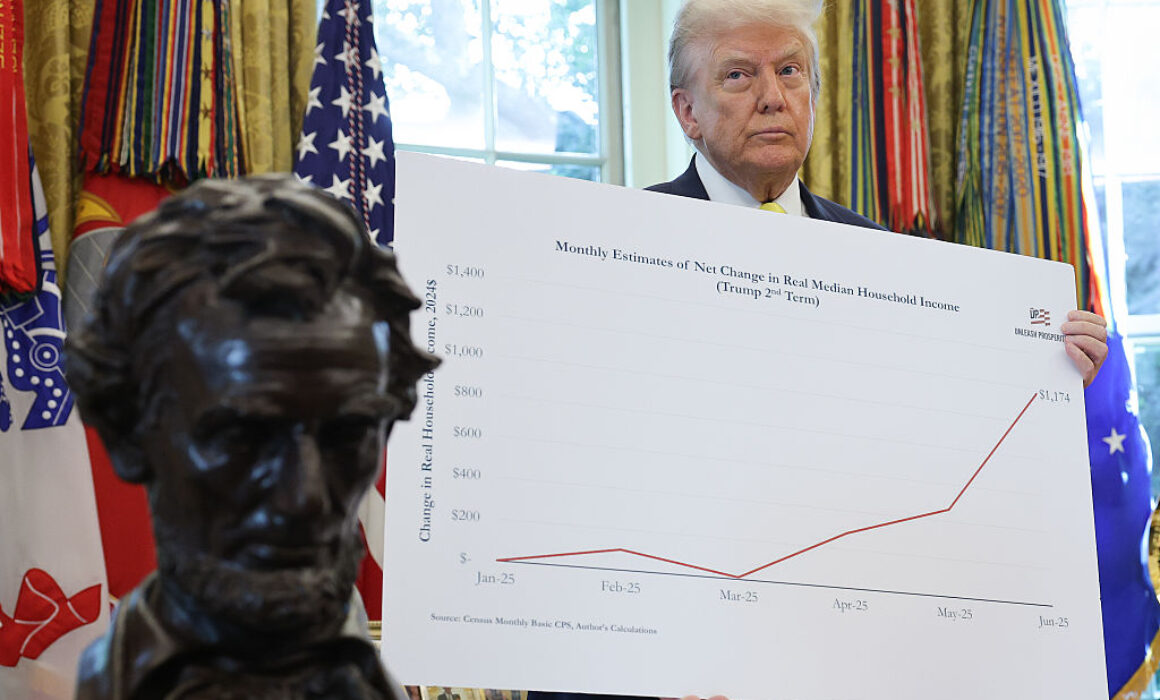BLS Firing Leaves the Whole Economy Vulnerable
August 8, 2025
Why undermining statistical credibility matters.
The Roosevelt Rundown features our top stories of the week.

Donald Trump displays a chart with economic data in the Oval Office on August 7. (Win McNamee/Getty Images)
The US Economy and Democracy Rely on Credible Data
Last week, President Trump fired Bureau of Labor Statistics (BLS) Commissioner Erika McEntarfer, the latest target of the administration’s attacks on public service. BLS is responsible for collecting and analyzing data about joblessness, wages, inflation, prices, and workplace injuries—information that is vital for policy decisions about Americans’ quality of life. For MSNBC, Roosevelt Principal Economist Michael Madowitz wrote about why markets, which “barely shrugged” in response to last Friday’s news, should be more worried.
“The jobs data that led to McEntarfer’s firing moved markets precipitously [Friday] morning,” Madowitz wrote, “yet the prospect that data might be under threat created essentially no effect later that day.” Financial markets and the most powerful actors within them “trade, invest and govern with confidence in the accuracy and objectivity of the very data they now seem indifferent to as it comes under pressure.”
Trump’s politically motivated personnel decisions are undermining the credibility of that long-trusted data. In a baseless explanation for firing the bureau chief, Trump accused the agency of rigging monthly unemployment statistics—even though revisions of jobs data are routine. “Politicizing economic statistics is a self‑defeating act,” Madowitz said last week. “Credibility is far easier to lose than rebuild, and the credibility of America’s economic data is the foundation on which we’ve built the strongest economy in the world.”
BLS data are used for some of the highest-stakes decisions about our economy, like adjusting tax brackets and setting interest rates. “We may never notice the public servants who devote years to ensuring the US economy can thrive atop the best objective data in the world,” Madowitz writes. “Unfortunately, we’ll notice all too quickly if that foundation starts to crumble.”
Read the op-ed: “Trump Fired the BLS Chief over the Jobs Report and the Markets Shrugged. That’s Concerning.”
Allison Zelman Joins Roosevelt as Chief Strategy Officer
This week, Allison Zelman joined the Roosevelt Institute as Chief Strategy Officer. Zelman, who most recently served as chief of staff at the Department of Labor, will play a central role in strategy development, government affairs, and partnership engagement. She brings with her decades of leadership experience in policy and advocacy for labor rights and economic mobility.
“We’re at a critical moment for our economy and our democracy—people are demanding real results in their lives,” said Zelman. “The Roosevelt Institute is uniquely positioned to meet this moment, and I’m honored to join a team that’s leading the way to reshape the economy to better serve working people.”
What We’re Talking About
What We’re Reading
- Roosevelt’s Suzanne Kahn joined Marketplace to discuss the rise in unemployment among recent graduates and how college degrees no longer guarantee economic security.
- For more on this trend, read Kahn’s 2021 report on policy interventions to help new labor market entrants and reduce intragenerational wealth inequality.
- Allowing savings in 401(k) retirement plans to be invested in cryptocurrency and private equity would be a financial disaster in the making. Trump just took the first step toward making it possible.
- Roosevelt Senior Fellow Lenore Palladino spoke with Ms. Magazine about women and the economy, recounting how the COVID-19 economic recovery invested in manufacturing but left the care workforce behind: “So much of the conversation among economists and among policy people about infrastructure has always been about male-dominated infrastructure,” she said. “We cannot rebuild our economy or build back better, as it were, with male-dominated sectors and not female-dominated sectors.”
- In May, Roosevelt’s Todd N. Tucker and Felicia Wong spoke at Beyond Neoliberalism: Pathways to a New Economy and Politics, a convening of scholars, policymakers, and journalists discussing how states can reshape markets and win broad democratic support for progressive policies.
- You can now access the event archive, including session recordings, highlight reels, and exclusive interviews.
